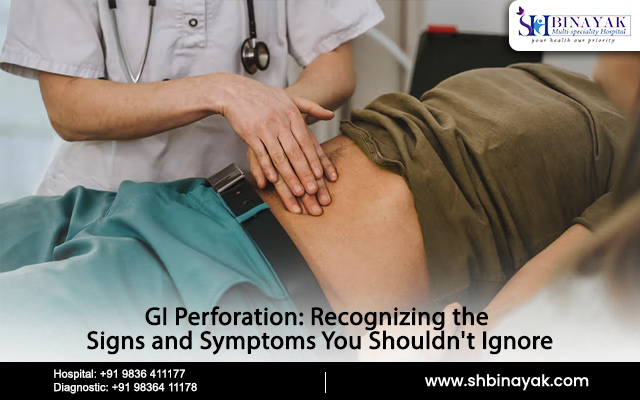Gastrointestinal perforation (GP) is a severe condition in which a hole develops in the gastrointestinal (GI) tract. It can result from various causes, including health conditions or trauma and often requires prompt surgery to repair the damage. Our renowned gastroenterologists at SH Binayak Multi-speciality Hospital discuss the multiple symptoms which may indicate the need for GI perforation surgery.
Symptoms You Must Watch Out For
Recognizing the symptoms of GI perforation can be lifesaving. Common signs include:
- Severe Abdominal Pain: A sudden and intense pain in the stomach or abdomen that worsens over time.
- Fever and Chills: These symptoms may accompany the pain, indicating an infection.
- Nausea and Vomiting: Persistent nausea and vomiting can indicate GI perforation.
- Fatigue and Shortness of Breath: These symptoms cause the body’s response to severe internal issues.
- Changes in Bowel Movements: Passing less gas, stool or urine than usual can signal a problem.
How is GI Perforation Caused?
GI perforation arises from several conditions or factors, such as:
- Health Conditions: Issues like appendicitis, diverticulitis or inflammatory bowel diseases (such as Crohn’s disease) can lead to perforation. Peptic ulcer is also one of the leading diseases caused due to GI Perforation.
- Trauma: External injuries, such as knife wounds or gunshot wounds, can create perforations.
- Surgical Complications: Previous surgeries might increase the risk, especially if foreign objects or chemicals were involved.
Diagnosis and Treatment Options
Before opting for GI Perforation Surgery, gastroenterologists usually perform diagnostic tests like CT scans and X-rays to confirm the presence of a perforation. Blood tests help assess the severity of infection and other complications (if any).
Treatment Options
In most cases, treatments typically involve emergency surgery to repair the perforation and address any underlying issues. In some cases, antibiotics alone may be used if the perforation has sealed on its own.
Long-Term Management
The management of Gastrointestinal Perforation depends on several factors, including the size of the perforation, the patient’s overall health and how quickly treatment is administered. Early intervention significantly improves recovery chances.
Final Thoughts
GI perforation is a critical condition that requires prompt medical attention. If you experience any severe abdominal pain, fever or other related symptoms, seek help immediately. Our specialists SH Binayak Multi-speciality Hospital, are dedicated to providing precise care for GI perforation Surgery and ensuring the best possible outcomes for our patients.



